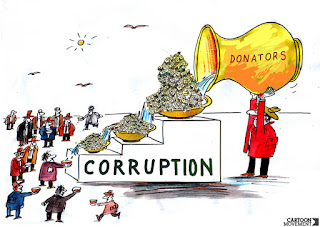'Better Together', the name for the no campaign for the
Scottish Independence referendum, is officially supported by three groups: the
Conservative and Unionist Party, the Labour Party and the Liberal
Democrats. Let’s look at how each of
them is contributing to the ‘better together’ campaign, as well as their
individual views towards Scotland.
"Don't forget about me!" Nigel Farage after proving he cares about Scotland by launching his party's Aberdeen Donside by-election campaign from a pub in Edinburgh
The Conservative and Unionist Party
Despite being the senior partner in power, the Conservatives
have decided to wait until after the referendum before enacting their
policies.
We do know what their
intentions will be however.
This article
in the Telegraph is very clear:
The main quotes to note are as follows:
Gordon Henderson, the
MP for Sittingbourne and Sheppey, said uneven public spending was fuelling
English resentment at Scotland and undermining the Union the Conservatives are
committed to preserving.
“There is increasing
resentment within England about this – there is a feeling that we are treated
less favourably,” he added.
“The Barnett Formula
is well out of date and needs to be scrapped entirely. If we are a United
Kingdom – and I hope we remain so – then we should all receive the same level
of support from the Government.”
This MP is calling for the Barnett formula, which allocates
funding to Scotland based upon spending in England, to be replaced. Unfortunately, he isn’t calling for the money
raised in Scotland to stay in Scotland, which would increase the power and
funding available to our parliament. His
solution is for all ‘regional’ funding to be limited, whilst allowing ‘UK’
expenditure (which is primarily spent in the southeast of England) to be excluded.
Westminster's view on Scotland's wealth
This option ignores Scotland’s additional income, as well as
the different circumstances we face.
Having a less densely populated nation and poorer infrastructure due to
years of underinvestment, we need certain expenditures that aren’t required in
London. Under the Barnett formula, we contribute
more than we receive back; this would only be exaggerated further under Gordon
Henderson’s plans.
David Mowat, the MP
for Warrington South, said: “We should be looking at the Barnett Formula now,
thinking about moving towards a more needs-based formula.” he added.
“I appreciate that the
Government doesn’t want to be looking at these things at the moment, but we
should be starting to think about this now. There is no reason for us not be
starting to address this issue now.”
David Mowat MP agrees that the Barnett formula should be
changed. Once again, however, he ignores
where the money that gets divided comes from.
He calls for a ‘needs-based’ formula.
Do you believe our 4% share in Westminster Politics will be enough to
ensure our needs are met?
Mr Selous said: “I am
very encouraged that two Cabinet ministers have gone on the record to say that
the Barnett Formula will not be here for ever. This is something that people in
England are concerned about.”
One Conservative
source within the Government suggested that the party could fight the next
general election on a clear promise to reform public spending rules for the
UK’s member nations.
Official Tory Party Policy (probably)
It’s safe to say what voting no means if the Conservatives win;
power will be centralised in London and the Scottish Parliament will be
weakened. But what about the Labour
party, what plans do they have? Let’s look
at what Labour leader Ed Miliband thinks:
“One nation Labour is
about reaching out to every part of Britain, it’s about a party that is as much
the party of the private sector as the public sector, a party of south as well
as north, a party determined to fight for the future of the United Kingdom, and
a party rooted in every community of our land.
I’ve set out a vision
of what this country can be, one nation, and in 2013 we will be setting out
concrete steps on making that vision a reality from business to education to
welfare.”
In this speech, given by Mr Miliband in his 2013 New Year’s
address, we see Labour’s attitude towards the Scottish Parliament. If we take these words as accurate, then
decisions regarding ‘business to education to welfare’ will need to be made
centrally (from London).
A ‘one nation’ approach to business means that the rates relief
that over 89,000 small businesses in Scotland enjoy will be gone. A ‘one nation’ approach to education means
£9,000 per year tuition fees (with the probability that they will rapidly
increase in future). A ‘one nation’
approach to welfare means that every Westminster cut will have to be
implemented in full in Scotland.
"I can make decisions from London which are best for everyone," Ed Miliband (probably)
The only other conclusion we can make is that Labour is
ignoring Scotland. Mr Miliband has a
little form in this regard. Let’s look
at his initial ‘one nation’ speech:
"First, we should
start with language. We all know that the beginning of any real connection with
a neighbour or colleague, work-mate or friend is a conversation. But we can
only converse if we can speak the same language.
So if we are going to
build One Nation, our goal should be that everyone in Britain should know how
to speak English. We should expect that of people that come here. The last
Labour government raised the language requirements for people seeking to enter
Britain on work and family visas, that was the right approach.
But of course there is
a minority who have come here without being able to speak English. This makes
life harder for them - those who don't speak English are less able to get a
good job, less able to make the most of being in this country. And it is also
bad for Britain as a whole, stopping us building the bond we need between
newcomers and those who have been here for generations.”
Mr Miliband doesn’t appear to have much time for those who
can’t speak English. And this isn’t a
quote taken out of context, as his speech made no mention of Welsh, Scots,
Gaelic or Sign Language. Perhaps ‘One
Nation’ really means ‘One Language’.
What about the third party of ‘better together’, the Liberal
Democrats. Couldn’t those of us who want
a strong Scottish parliament hope that they form the next Westminster
government? Unfortunately, under their
current leadership, even this won’t help devolution.
Even if we ignore the hypocrisy of their current calls for
greater devolution following months of campaigning for this option to be
excluded from the referendum, we can see examples of them saying one thing, and
voting differently.
Their 2006 Steel Commission called for ‘a specific tax
sharing mechanism for North Sea oil revenues’, and yet now the Liberal Democrat
leadership shares power in Westminster, they favour oil & gas revenues
being managed on a UK basis.
Nick Clegg (for some reason this was the only image of him we could find...)
When contributing to the Calman Commission, the Liberal
Democrats favoured devolving corporation tax to Scotland, but their leadership voted
against this during the scrutiny process of the Scotland Bill.
Air passenger duty, another area the leadership of the Liberal
Democrats used to want the Scottish Parliament to have authority over, is, now
they are in power, something they oppose.
We can see from these examples that when given the opportunity, the
Westminster based leadership of the Liberal Democrats are just like their
unionist brothers in not wanting to strengthen the Scottish Parliament. Getting into office has made them devout believers in the
Goldilocks Axiom.
The different strands of the no campaign are all
in sync with one another, epitomised by former Labour chancellor Alistair
Darling's starring role at the Scottish Conservative conference today. He will fit in perfectly because when it comes to
Scotland, he, the Labour Party, the Conservatives and the Liberal Democrats are all in agreement; no independence, no direct representation,
no change to the status quo.
An independent Scotland,
owing to a more proportional electoral system and a greater choice of candidates, offers a future of far
greater scope than the three nearly identical visions of Westminster.
It’s clear to see the plans that the Axis of
‘non Devo’ have for Scotland.
Do we
really want to pin our hopes that the ‘least worst’ gets in?
Drew


















